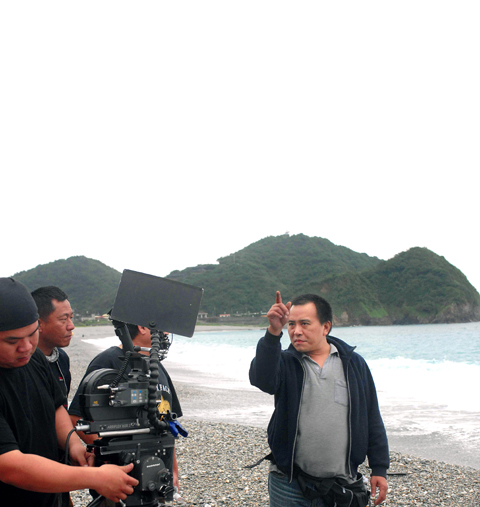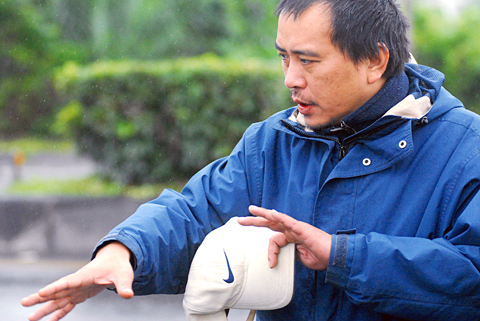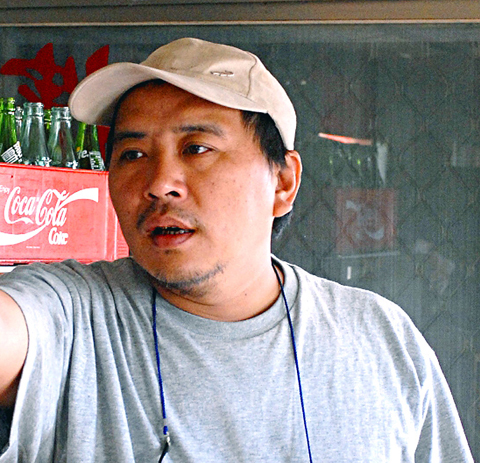An inveterate betel nut chewer and chain smoker, director Chang Tso-chi (張作驥) cuts a bit of a rough-hewn, gangsterish figure. But he’s also exceedingly polite and possesses a natural ability to put people at ease, as when he arrives at the outdoor cafe in Ximending (西門町) for our interview, apologizing for being half an hour late, 8-year-old son in tow. They’ve just seen an advance screening of Chang’s latest film, Soul of a Demon (蝴蝶).
Chang, who is divorced, is playing the father today, but our interview lasts long past the planned 60 minutes, as he wanders from anecdotes such as a story about his disastrous fishing trip with a group of smokers in a remote area where they couldn’t find cigarettes, to observations about Ximending’s street culture when he asks his assistant to fetch him a pack of betel nuts. Even with his non-linear style of thinking, Chang is a natural storyteller. He enthralls me with his expressive cadence, sharp repartee, and the occasional swear word.
Witty and cordial, the 47-year-old director talked about his art, the craft of filmmaking and his latest work, which took five years to complete and suffered a series of setbacks, including a one-year-long halt in production — the company that was to provide CGI effects backed out — that almost defeated him.

PHOTO COURTESY OF CHANG TSO CHI FILM STUDIO
Taipei Times: When did you first develop a passion for cinema?
Chang Tso-chi: The first film I saw was Fist of Fury (精武門). Whenever a Japanese person appeared in the film, people would throw things at the screen. Everyone [in the theater] had a pair of plastic nunchucks; everyone went crazy and cheered and clapped whenever Bruce Lee (李小龍) started kicking ass.
When I was doing my military service I had a good friend who is now a professor. One day he asked me: “What are you going to do after you go back home — fix televisions or something?” I thought about it and decided to get into a career in photography because photographers seem to have more freedom. I visited a few colleges and didn’t like them. Then one day I went to Yangmingshan [where Chinese Culture University (中國文化大學) is located]. It was misty [outside] and I was like, “Wow, you could make a martial arts film here.” That, and as a drama major you got to walk past the dance department where there were pretty girls in one classroom after another. But seriously, Taiwanese New Wave cinema had just taken off when was I preparing for the college entrance examination. Before that no one wanted to study cinema. In my year, around 300 people were competing for seven openings.

PHOTO COURTESY OF CHANG TSO CHI FILM STUDIO
(After graduating from Chinese Culture University, Chang broke into filmmaking as a continuity clerk, or script supervisor. During his 14 years in the industry before his directorial debut, Chang worked with such film doyens as Yu Kang-ping (虞堪平), Hou Hsiao-hsien (侯孝賢) and Tsui Hark (徐克). His first film, 1993’s Midnight Revenge (暗夜槍聲), drew little attention, but his next three, Ah Chung (忠仔, 1996, also known as Zhong zi), Darkness and Light (黑暗之光, 1999) and The Best of Times (美麗時光, 2002), firmly established Chang as an internationally known auteur recognized for his tender but unflinching, incredibly lifelike portraits of people living on the margins of society.)
TT: What was the most important thing you learned during the 14 years before you made your first film?
CT: I learned that filmmaking isn’t rocket science. Your job is merely to visualize what is in your own mind and make other people believe it. Watching a movie is a magical experience, don’t you think? You enter the theater holding a box of popcorn. You know the whole thing is fake. The lights go off, you sit there eating popcorn and you surrender yourself to whatever is being shown on the screen for 90 minutes. When the lights are turned back on, you go, “Hmm, that’s not real,” and you leave the theater. Some [directors] move you and make you cry. Others wake you up and make you think.

PHOTO COURTESY OF CHANG TSO CHI FILM STUDIO
There are people who say art-house cinema bores the heck out of audiences — you say my films are like that? [Chang needles the young PR handler who remains with us throughout the entire interview]. My films are calculated. When the story hits the 30-minute mark something big always happens to wake up the people who are half-asleep.
TT: Why is that? Is it because you are afraid of boring your audiences?
CT: No. My films don’t have flashbacks or alternate between color and black-and-white. In terms of form, I have my own limits and idiosyncrasies. Besides, audiences aren’t familiar with most of my actors. I build up my stories not from who my actors are but from [the characters’] family relationships and how they interact with each other. It usually takes 30 minutes before the narrative finally starts. [At the end] people in the audience are like, “Oh OK. Now I know what this family is all about. What? The film is over already? But who was that guy? Can they play that again?”
TT: Soul of a Demon was originally three hours long, but you cut a lot from supporting roles like the grandfather.
CT: Yes. Since I’m not a master [director], I really shouldn’t pull a stunt like that. The reason why it was originally three hours .
long is that I tried to tell a complete story without the planned CGI effects. Do you remember the opening scene where Che is on his way home along the Suhua Highway (蘇花公路)? There were supposed to be [CGI] dolphins leaping out of the water [in that scene]. I have a habit of setting the tone for my films around one minute after they begin. So people think, “OK, from this point on I won’t be able to tell what is real and what is not.” The films I made before are realistic in structure. [For Soul of a Demon], I wanted to jump out of the frame. Put two real things together and all of sudden you get absurdity.
TT: Does it take you a long time to conceptualize and develop your stories?
CT: Not really. It’s just a bad habit I used to have. I usually take one year off after each work and spend all the money I earned. When do I plan the next project? When the accountant says to me, “We don’t have enough money to pay for the bills next month.”
TT: Doesn’t your film studio do television productions that make money?
CT: No, we do mostly film productions. Even Holy Ridge (聖稜的星光) [an award-winning television series shot in super 16mm film] was like 11 miniature movies. That was an entirely new experience for my company: we lost NT$30 million. The government has made lots of effort to promote digital cinema. I have nothing against that. The question is whether or not a government should promote digital photography? No, because it is too easy. In traditional filmmaking even a focus puller needs 10 years to master [his or her] craft. Experience is everything since you don’t know what you have on the film until it’s developed. I don’t think that any effort is being made to [compared to two decades ago] train and support experienced, professional film technicians in Taiwan.
I decided to make the effort myself and spent NT$10 million of the profit from The Best of Times on cinematography equipment. While my team was in Shei-pa National Park (雪霸國家公園) shooting Holy Ridge, I was in the city raising money and training assistants. We sent out nearly 300 assistants to the mountain during two years of filming. Of course sometimes late at night I say to myself, “You crazy idiot.”
TT: Why do you prefer working with amateur and novice actors?
CT: A script has no temperature and humidity. You have to feel this on the set. You have to have surprises and adventures. With professional actors, the film is done when the script is done. When the director wants to change things around, they’ll be like, “But I already memorized my lines.” And you’ll be like, “Didn’t I just give you the script like one minute ago?”
TT: You ran into a lot of obstacles while making Soul of a Demon. Did that experience alter your view of independent filmmaking?
CT: I thought about giving up independent filmmaking when the production was forced to come to a halt. Later when the money from CMC Movie Corporation (中環娛樂) came in, I felt that perhaps I should make some changes and work with big investors. I realize that big investors have their own agenda. They don’t do NT$30 million productions. They do NT$800 million. But I’m not interested in making films about who fought who during the Three Kingdoms period. Stories about Taiwan are fascinating enough for me. Film is all about drama. It’s good enough to make a film that moves people and keeps your investors happy. I promised my father that I would make a film he could understand. [Chang’s father passed away during the shooting of Soul of a Demon. Some critics have observed that writing a character with an Oedipus complex into the film was Chang’s way of dealing with his loss]. ... My father was an ordinary person, a public servant. People from his generation believed in Chiang Kai-shek (蔣中正). Regardless of whether he was press-ganged or tricked into being a solider, that was his life.
I am making a film about a father. Not my father, but 20 fathers. It’s a compilation of shorts that make you cry in five minutes. It was a challenge.
TT: Have you thought about telling the story of the Mainlanders who came [to Taiwan] with the KMT army through the story of your father?
CT: Yeah, that’s gong to be my next project [temporarily titled Summer Dream (暑假作業之夏日的夢)]. It’s about an 8-year-old boy who visits his sick granddad in Shihding (石碇) [in Taipei County]. I want to capture the beauty of Shenkeng (深坑) and Shihding.
TT: It has been said that Soul of a Demon is closely related to the issue of identity, both on a historical and a personal level. What do you think about that observation?
CT: I’m a second-generation of Mainlander. But all my characters speak Taiwanese and Hakka. I chuckle every time my actors speak Mandarin. Mandarin doesn’t have the taste of real life, whereas Taiwanese and other [Chinese] dialects smell like living things. I remember Li Ao (李敖) once said there is no distinction between Mainlanders and Taiwanese [non-Mainlander Han Taiwanese] in Taiwan. The distinction is between the privileged and the underprivileged. I may start putting old KMT soldiers in my films and help them tell their own stories.

April 14 to April 20 In March 1947, Sising Katadrepan urged the government to drop the “high mountain people” (高山族) designation for Indigenous Taiwanese and refer to them as “Taiwan people” (台灣族). He considered the term derogatory, arguing that it made them sound like animals. The Taiwan Provincial Government agreed to stop using the term, stating that Indigenous Taiwanese suffered all sorts of discrimination and oppression under the Japanese and were forced to live in the mountains as outsiders to society. Now, under the new regime, they would be seen as equals, thus they should be henceforth

Last week, the the National Immigration Agency (NIA) told the legislature that more than 10,000 naturalized Taiwanese citizens from the People’s Republic of China (PRC) risked having their citizenship revoked if they failed to provide proof that they had renounced their Chinese household registration within the next three months. Renunciation is required under the Act Governing Relations Between the People of the Taiwan Area and the Mainland Area (臺灣地區與大陸地區人民關係條例), as amended in 2004, though it was only a legal requirement after 2000. Prior to that, it had been only an administrative requirement since the Nationality Act (國籍法) was established in

With over 80 works on display, this is Louise Bourgeois’ first solo show in Taiwan. Visitors are invited to traverse her world of love and hate, vengeance and acceptance, trauma and reconciliation. Dominating the entrance, the nine-foot-tall Crouching Spider (2003) greets visitors. The creature looms behind the glass facade, symbolic protector and gatekeeper to the intimate journey ahead. Bourgeois, best known for her giant spider sculptures, is one of the most influential artist of the twentieth century. Blending vulnerability and defiance through themes of sexuality, trauma and identity, her work reshaped the landscape of contemporary art with fearless honesty. “People are influenced by

Three big changes have transformed the landscape of Taiwan’s local patronage factions: Increasing Democratic Progressive Party (DPP) involvement, rising new factions and the Chinese Nationalist Party’s (KMT) significantly weakened control. GREEN FACTIONS It is said that “south of the Zhuoshui River (濁水溪), there is no blue-green divide,” meaning that from Yunlin County south there is no difference between KMT and DPP politicians. This is not always true, but there is more than a grain of truth to it. Traditionally, DPP factions are viewed as national entities, with their primary function to secure plum positions in the party and government. This is not unusual